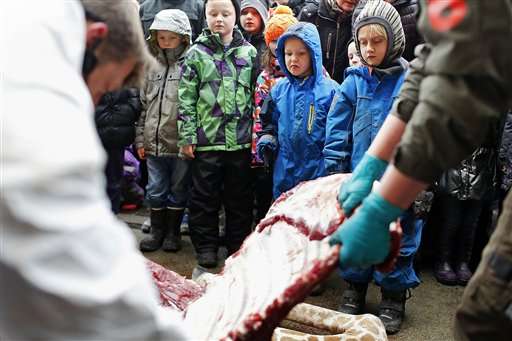In this Sunday, Feb. 9, 2014 file photo, children watch as Marius, a male giraffe, is dissected, at the Copenhagen Zoo, in Denmark, Sunday, Feb. 9, 2014. A Danish zoo is planning to publicly dissect a year-old lion that it has killed to avoid inbreeding—a year after another Danish zoo triggered massive online protests for killing a healthy young giraffe, dissecting it and feeding it to lions in front of children, it was reported on Saturday, Oct. 10, 2015. (Rasmus Flindt Pedersen/Polfoto via AP, File) DENMARK OUT
A European zoo organization says it supports a Danish park's plan to dissect a year-old lion culled to avoid inbreeding, adding some of the online uproar disregards the educational part of it.
David Williams-Mitchell of the Amsterdam-based European Association of Zoos and Aquaria, on Wednesday said dissection is common in European schools and "is a very well-proven tool for teaching children about anatomy."
The Odense Zoo will dissect the lion Thursday during the schools' fall break.
Many Danes have posted positive comments on the zoo's Facebook page with some agreeing that children will not be harmed by watching the dissection, which happens often in Denmark.
However, the zoo said Wednesday "threats or foul language" would be deleted after coarse language in English was used.
"It is mystifying to us why people who are objecting to this were not objecting to it when the animal was killed," Williams-Mitchell said.
The association, of which the zoo is a member, stressed the female lion was culled nine months ago after numerous unsuccessful attempts to find it a place in another park with "similar high welfare standards."
The Odense Zoo said the lion would have been in the same enclosure as her own father, and at some point he would start mating her. Another risk was that she could have been killed by another female lion as they were contending for the leading male's attention.
In February 2014, Copenhagen Zoo faced international protests after a giraffe was culled and dissected in front of children. It later was fed to lions publicly.
Lions in captivity are considered young adults when they are eight to nine months old.
© 2015 The Associated Press. All rights reserved.





















